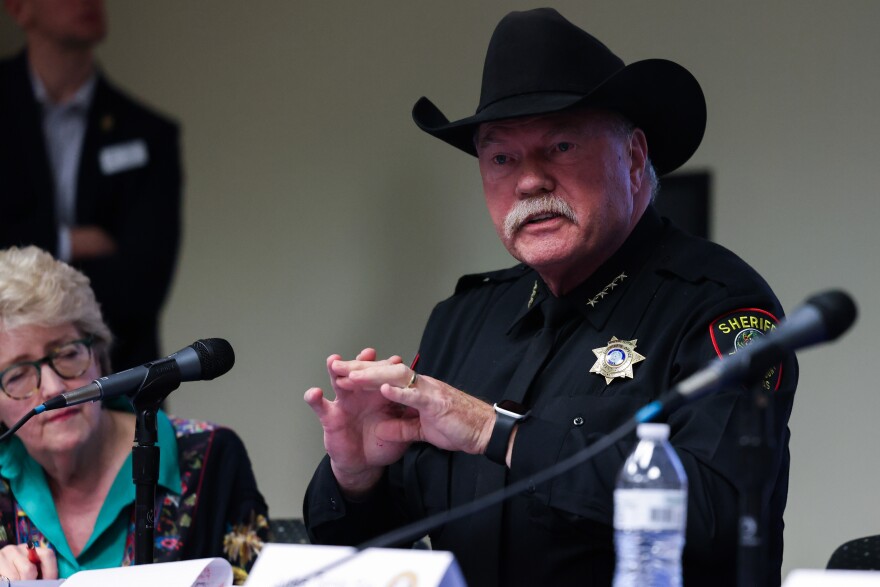Tarrant County Sheriff Bill Waybourn defended his record as jail administrator Thursday night, during a town hall where the public confronted him with questions about jail deaths and allegations of medical neglect behind bars.
Judges and local activists joined Waybourn on the panel, where the conversation kept coming back to the deaths: at least 60 since Waybourn took office in 2017, according to data from the Texas Attorney General’s Office and the Tarrant County Medical Examiner's Office.
At the Tarrant County Sub-Courthouse in Arlington, with an audience of more than 100 people, Waybourn promised transparency about any death that isn’t under investigation or litigation, and offered jail tours to anyone who wants one.
“We’d love to have you, love to show you what we do, and look at the noble men and women who are operating that, standing against good and evil every day,” he said.
Waybourn blamed a rise in the jail population for the increase in deaths during his tenure, but State Rep. Chris Turner, D-Grand Prairie, didn’t accept that explanation. He took the microphone during the audience questions segment.
"What I didn’t hear was an acknowledgment that 60 deaths in seven years is far too many. Do you agree that 60 deaths is too many to have in the Tarrant County Jail?” Turner asked.
“Representative, I promise you I don’t want to have one,” Waybourn said.
Drugs have made the problem worse, he added.
"Several things have happened. One, an incredible porous border, where we’ve had more drugs come into this county than ever before, and that has certainly made people more ill and more susceptible,” Waybourn said, without providing any specifics.

Beyond the numbers, the circumstances surrounding some of the deaths have been a focus for local activists, who are seeking a federal investigation of the county jail system.
Jailers missed checks on Dean Stewart before his death by suicide in 2020, leading the jail to lose state certification for six days, the Fort Worth Star-Telegram reported. The county agreed to pay $400,000 to settle a lawsuit over his death.
In September, the county agreed to settle another jail death lawsuit for $1 million. Two jailers are accused of falsifying their checks on Javonte Myers, who died of a seizure disorder in his cell in 2020. Myers lay dead in his cell for hours before anyone noticed, the lawsuit alleged. The two jailers face criminal charges.
“When those things happen, we hold them accountable,” Waybourn said.
When asked how he prevents something like the Myers situation from happening again, the sheriff said supervisors review jail video to make sure it matches up with documentation.
But questions remain about other deaths, like Robert Miller’s.
Miller died in jail custody in 2019, and the Tarrant County Medical Examiner’s Office declared his cause of death was a sickle cell crisis. A Fort Worth Star-Telegram investigation found Miller didn’t have sickle cell disease, and he was pepper sprayed repeatedly before he died.
The county promised to hire an independent investigator to reexamine Miller’s autopsy report, but then the county backpedaled. The outside review never happened, and the Tarrant County Medical Examiner’s Office doubled down on its conclusions, even as other medical experts cast doubt on them.
Waybourn told reporters after the town hall he trusted the county on Miller’s case.
Other lawsuits against the jail are still pending. One is on behalf of a woman who gave birth unattended in her cell, and whose baby later died.
Another lawsuit is from Cory Rodrigues, a former inmate who says jailers beat him so badly he had to go to the hospital. Last year, the Tarrant County DA’s Office dismissed all criminal charges against the jailers involved in Rodrigues’ beating, which was caught on tape.
Waybourn apologized to one audience member, Liz Piñón, who said her son Gabriel spent a week in jail without his medication last June. Gabriel is autistic and developmentally disabled. Both he and Liz spoke to KERA for a story while he was incarcerated in Tarrant County.

“Seven days. He was seven days without his medication,” Piñón told Waybourn. “My worry was that he [would] fall into depression, hurt someone, because he didn’t have the medication.”
Liz brought Gabriel’s medication list to the jail his first day there, she said, but it wasn’t until she spoke to KERA “that he finally, within 30 minutes, got his medication."
“I’m sorry that that happened,” Waybourn said.
KERA News is made possible through the generosity of our members. If you find this reporting valuable, consider making a tax-deductible gift today. Thank you.





